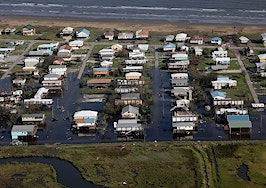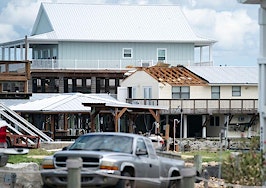No one can predict the future of real estate, but you can prepare. Find out what to prepare for and pick up the tools you’ll need at the immersive Virtual Inman Connect on Nov. 1-2, 2023. And don’t miss Inman Connect New York on Jan. 23-25, 2024, where AI, capital and more will be center stage. Bet big on the roaring future, and join us at Connect.
Bond market investors who fund most U.S. mortgages are getting a new climate risk tool to help them make sure they’re not underestimating the potential for storms, floods, wildfires and droughts to dent their returns.
Data and technology provider Intercontinental Exchange Inc. (ICE) has teamed up with investment research and consulting firm DeltaTerra Capital on a joint credit risk analytics solution for mortgage-backed securities (MBS) investors.
The new service provides climate risk analytics at the property, loan, deal and bond levels, translating physical climate risk estimates into financial risk assessments factoring in default risk, asset price depreciation and insurance costs.

Evan Kodra
“We are excited to work with DeltaTerra to offer customers this new joint product that estimates the potential change in value of real estate and mortgage-backed securities directly attributable to physical climate risk, which may not be reflected in market prices,” ICE’s Evan Kodra, head of sustainable finance R&D, said in a statement Monday.
The joint offering integrates ICE’s Physical Climate Risk Data, which includes geospatial climate, economic and demographic data, with DeltaTerra’s proprietary Klima financial risk models and market data.

Dave Burt
“The Klima models and analytics are an important toolkit providing transparency into whether markets are adequately factoring in future insurance costs and other climate-related fundamental drivers when buying and selling property, loans and related securities,” DeltaTerra CEO Dave Burt said in a statement. “The collaboration with ICE can bring these solutions to the market rapidly at scale with a leading climate and market data provider and we could not be more pleased to participate in this joint effort.”
As climate-related disasters grow in number and severity, insurance premiums are rising, with some insurers pulling out of high-risk markets altogether. It’s a problem not just for homeowners but also lenders and mortgage investors.
“Failure to obtain insurance coverage by the mortgagor is a technical default on the loan but is often handled by the mortgage servicer purchasing very expensive substitute coverage,” Michael Wara, former director of the Climate and Energy Policy Program at the Stanford Woods Institute for the Environment, testified before Congress in March. “As losses have accelerated due to wildfire, insurers and reinsurers are reevaluating their exposure, raising prices to the degree that regulators allow it, and limiting underwriting when they can’t fully price the risk.”
Hurricanes, wildfires and flash floods make for dramatic television news stories, but climate change could also bring less spectacular, but equally momentous changes, Kodra suggested on LinkedIn in June.
“What if portions of the U.S. just become too hot and dry to live in?” Kodra asked. “Fixed income markets depend on the stability of property values. Climate change is going to completely change that at some point and will make some places functionally obsolete. What if we are forced to abandon entire communities? Will cities with more amenable climates attract those who need new homes, and treat climate migration as the opportunity it is and not a threat? We’ve got to get beyond just measuring climate risk and ask these uncomfortable questions about how significantly the world is going to change, and figure out how we’re going to adapt.”
Last year Fannie Mae and Freddie Mac’s federal regulator, the Federal Housing Finance Agency, put the mortgage giants on notice that they must factor the financial risks posed by climate change into their decision-making.
The FHFA “recognizes that climate change poses a serious threat to the U.S. housing finance system,” the agency says on a webpage detailing its climate initiatives.
In its annual report to Congress in June, FHFA said it’s working with Fannie and Freddie on “an improved understanding of climate scenario analyses, improved capacity for climate-related disclosures, and forward-looking and long-term ESG [environmental, social, and governance] strategies to ensure the integration of climate risk within their decision making.”
The agency’s 2023 Scorecard for Fannie Mae and Freddie Mac, which spells out the FHFA’s priorities and expectations for the mortgage giants, directs the companies to “strengthen risk management capabilities in identifying, assessing, controlling, monitoring and reporting on climate risk.”
The Mortgage Bankers Association has also warned of the potential for storms, floods, drought and wildfires to stretch the National Flood Insurance Program to the breaking point, undermine home prices in vulnerable communities, and drive more homeowners to default on their mortgages.
Mortgage funding by source, 2001-2023

Source: Urban Institute monthly chartbook, August 2023.
About two-thirds (68 percent) of U.S. mortgages originated during the second quarter of 2023 were bundled into securities and sold to investors, according to data compiled by the Urban Institute and Inside Mortgage Finance.
Fannie Mae, Freddie Mac and Ginnie Mae (which securitizes FHA and VA loans) guarantee payments to investors in most mortgage-backed securities (MBS). So-called “private-label securities” (PLS) that lack such backing were the primary source of funding for subprime lenders from 2001 to 2007 but accounted for only 2 percent of the market in Q2 2023.
Sometimes referred to collectively as the government-sponsored enterprises, or GSEs, Fannie and Freddie provided backing on 43 percent of mortgages originated during Q2 2023, with Ginnie Mae-backed FHA and VA securitizations accounting for another 23 percent. Portfolio lenders, who keep loans they make on their books as investments, accounted for the remaining 32 percent of funding.
The U.S. Department of Housing and Urban Development has published its own climate adaptation and resilience plan, which outlines objectives that include reducing climate-related financial risks to FHA and other mortgage programs.
Get Inman’s Mortgage Brief Newsletter delivered right to your inbox. A weekly roundup of all the biggest news in the world of mortgages and closings delivered every Wednesday. Click here to subscribe.












